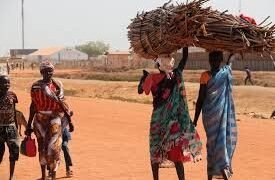Herders scooping murky water from a small pond in grasslands in South Sudan are well aware of the dangers they face if they drink it.
“The water is dirty because this place has oil – it has chemicals in it,” says their chief, Chilhok Puot.
Nyatabah, a woman from this community raising cows in the heart of oil fields in Unity State, adds: “If you drink it, it makes you pant and cough.
“We know it’s bad water, but we don’t have anywhere else, we’re dying of thirst.”
A former oil engineer, David Bojo Leju, has told the BBC World service that flooding in the area is washing pollution into water sources.
Large swathes of the state have been under water for several years after unprecedented flooding, which scientists say has been worsened by climate change.
Mr Bojo Leju says the floods are a “disaster” and that pollution from mismanaged oil facilities is a “silent killer” spreading across the state.
South Sudan is the world’s youngest country and one of its poorest, with a government hugely dependent on oil revenue.
Unity State, a major oil-producing state, has always experienced seasonal flooding. But in 2019, extreme rains brought a deluge that engulfed villages, grasslands and forests. Year after year of intense rainfall followed. The water built up, trapped on the clay soil.
At the worst point in 2022, two-thirds of Unity State were submerged, according to the UN World Food Programme (WFP) – even now, it says about 40% is still under water.
Advertisement
Mr Bojo Leju worked for eight years for the oil consortium Greater Pioneer Operating Company (GPOC), a joint venture between Malaysian, Indian and Chinese oil companies – with South Sudan’s government owning 5%.
After a major pipeline rupture five years ago, he started photographing and filming pools of oily water and heaps of blackened soil in locations in Unity State, including sites near Roriak, where the herders live.
He says spills from oil wells and pipelines were “a recurring situation”, and that he was involved in transporting contaminated soil away from roads, so it would not be seen.
He tried to raise his concerns with company managers, but he says little was done and “there was no treatment plan for soil”.
Mr Bojo Leju also says “produced water” – water released from the ground when oil is extracted and often containing hydrocarbons and other pollutants – was not properly treated.
Mr Bojo Leju also says “produced water” – water released from the ground when oil is extracted and often containing hydrocarbons and other pollutants – was not properly treated.
Mr Bojo Leju also says “produced water” – water released from the ground when oil is extracted and often containing hydrocarbons and other pollutants – was not properly treated.
Mr Bojo Leju also says “produced water” – water released from the ground when oil is extracted and often containing hydrocarbons and other pollutants – was not properly treated.












